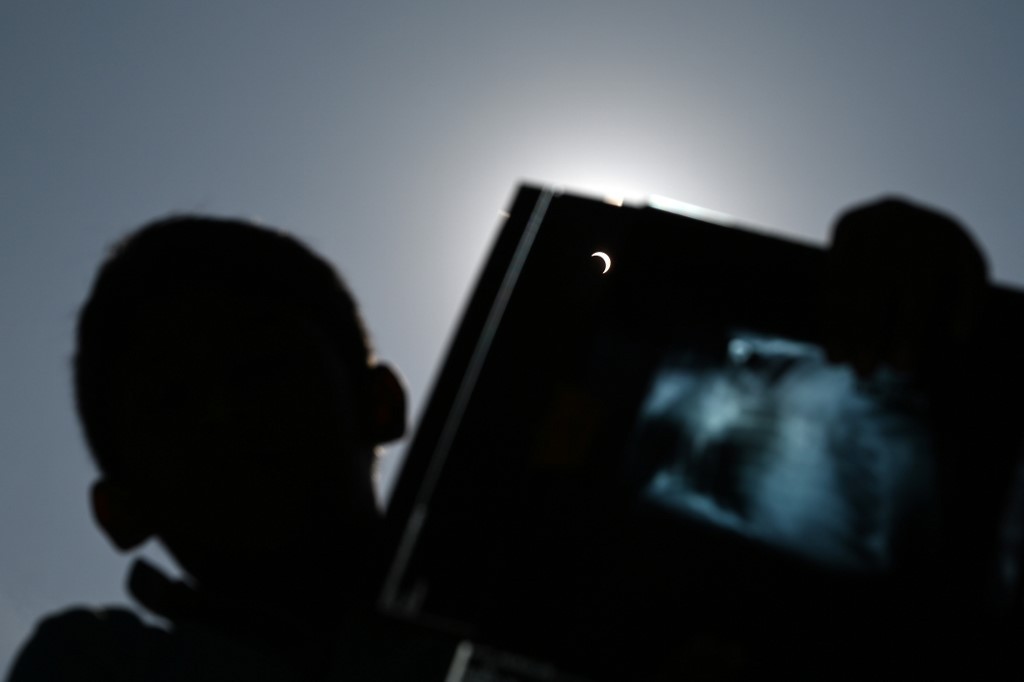Popular Reads
Top Results
Can't find what you're looking for?
View all search resultsPopular Reads
Top Results
Can't find what you're looking for?
View all search results'Ring of fire' eclipse wows across Asia
While these types of eclipses occur every year or two, they are only visible from a narrow band of Earth each time and it can be decades before the same pattern is repeated.
Change text size
Gift Premium Articles
to Anyone
S
kywatchers from Saudi Arabia and Oman to India and Singapore were treated to a rare "ring of fire" solar eclipse Thursday.
Annular eclipses occur when the Moon is not close enough to the Earth to completely obscure the Sun, leaving a thin ring of the solar disc visible.
While these types of eclipses occur every year or two, they are only visible from a narrow band of Earth each time and it can be decades before the same pattern is repeated.
Depending on weather conditions, this year's astronomical phenomenon was set to be visible from the Middle East across southern India and Southeast Asia before ending over the northern Pacific.
Hundreds of amateur astronomers, photographers and set up by Singapore's harbour for what some described as a "once in a lifetime" event.
"The next one will happen in about 40 years I think," said Jason Teng, 37, who took the day off work to photograph the eclipse.
The amateur astronomer used a special solar filter on his telescope as there is no safe period to observe an annular solar eclipse.
Alexander Alin 45, a geophysicist from Germany, travels around the world following eclipses.
"It's only two minutes, but it's so intense that you talk about it with your friends, family for the next month," Alin said.
Eclipse stops play
In southern India, people gathered on the beaches in Tamil Nadu to watch the event.
The eclipse even affected cricket, with play delayed by two hours in a first-class match between Mumbai and Rajkot.
The eastern state of Odisha declared a public holiday, with all government offices, courts, schools and colleges closed.
But in New Delhi, cloud and pollution blocked the view and Prime Minister Narendra Modi tweeted his disappointment, although only a partial eclipse would have been visible that far north.
"Like many Indians I was enthusiastic about solareclipse2019," Modi said.
Like many Indians, I was enthusiastic about #solareclipse2019.
Unfortunately, I could not see the Sun due to cloud cover but I did catch glimpses of the eclipse in Kozhikode and other parts on live stream. Also enriched my knowledge on the subject by interacting with experts. pic.twitter.com/EI1dcIWRIz
— Narendra Modi (@narendramodi) December 26, 2019
"Unfortunately, I could not see the Sun due to cloud cover but I did catch glimpses of the eclipse in Kozhikode and other parts on live stream."
In Indonesia, hundreds of people gathered outside Jakarta Planetarium to watch the event using protective glasses supplied by the planetarium, hoping for clear skies at the time of maximum eclipse.
"I could see the eclipse this morning and now am very excited to see the peak though now it is cloudy," said Chandra Ayu Dewi, 39, who arrived at 7:00 am with her children.
Nobar #GerhanaMatahariCincin di area Planetarium, TIM, Jakarta. Pemandangan indah di bumi Cikini untuk bersama menyimak peristiwa langit. Gerhana Matahari Cincin, 26 Desember 2019. pic.twitter.com/FNTvjqAh7b
— Nunu Azizah (@NuNu1412) December 26, 2019
Outside the narrow band where the "Ring of fire" effect can be observed, skywatchers would see a partial solar eclipse.
The next annual eclipse in June 2020 will be visible to a narrow band from Africa to northern Asia.
The following one in June 2021 will only be seen in the Arctic and parts of Canada, Greenland and the remote Russian far east.











